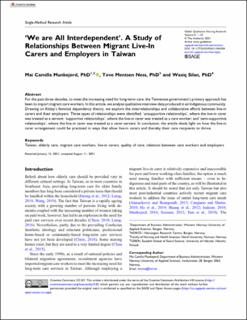We Are All Interdependent': A Study of Relationships Between Migrant Live-in Carers And Employers in Taiwan
Peer reviewed, Journal article
Published version
Permanent lenke
https://hdl.handle.net/11250/2829376Utgivelsesdato
2021Metadata
Vis full innførselSamlinger
Originalversjon
Munkejord, M. C., Ness, T. M., & Silan, W. (2021). ‘We are all interdependent’: A study of relationships between migrant live-in carers and employers in Taiwan. Global Qualitative Nursing Research, 8. 10.1177/23333936211043504Sammendrag
For the past three decades, to meet the increasing need for long-term care, the Taiwanese government’s primary approach has been to import migrant care workers. In this article, we analyse qualitative interview data produced in an Indigenous community. Drawing on Kittay’s feminist dependency theory, we explore the interrelationships and collaborative efforts between live-in carers and their employers. Three types of relationships were identified: ‘unsupportive relationships’, where the live-in carer was treated as a servant; ‘supportive relationships’, where the live-in carer was treated as a care worker; and ‘semi-supportive relationships’, where the live-in carer was treated as a carer-servant. In conclusion, the article sheds light on how the live-in carer arrangement could be practised in ways that allow live-in carers and thereby their care recipients to thrive.

